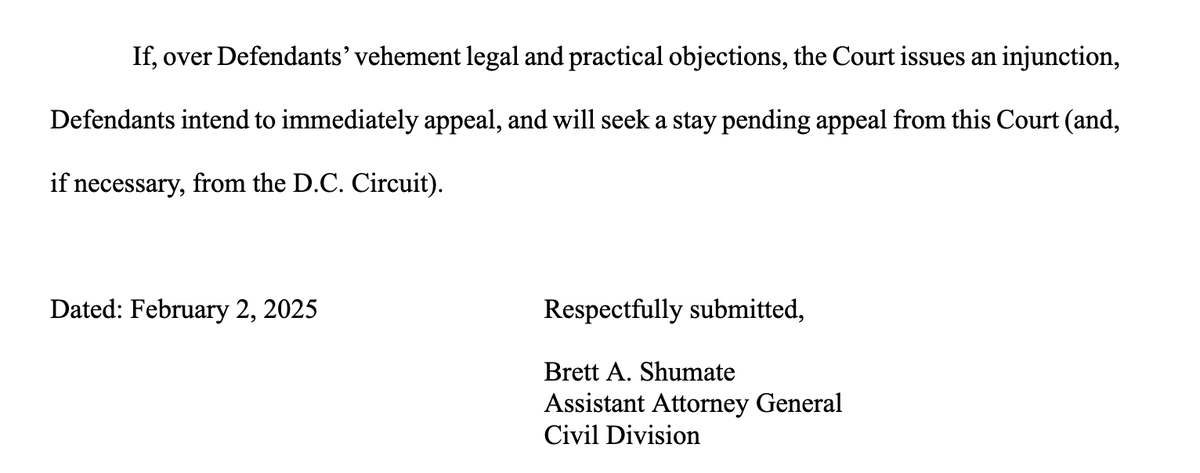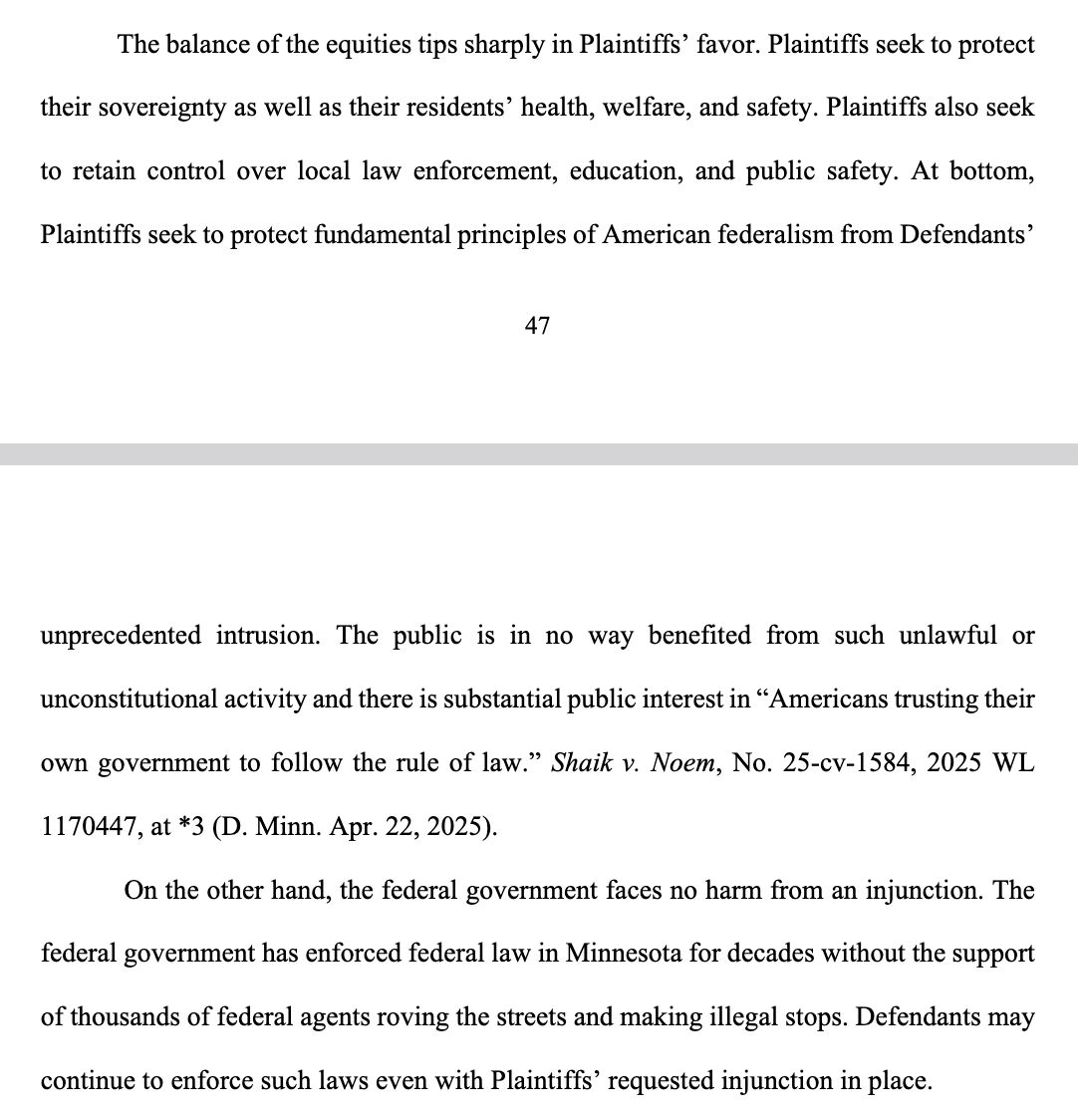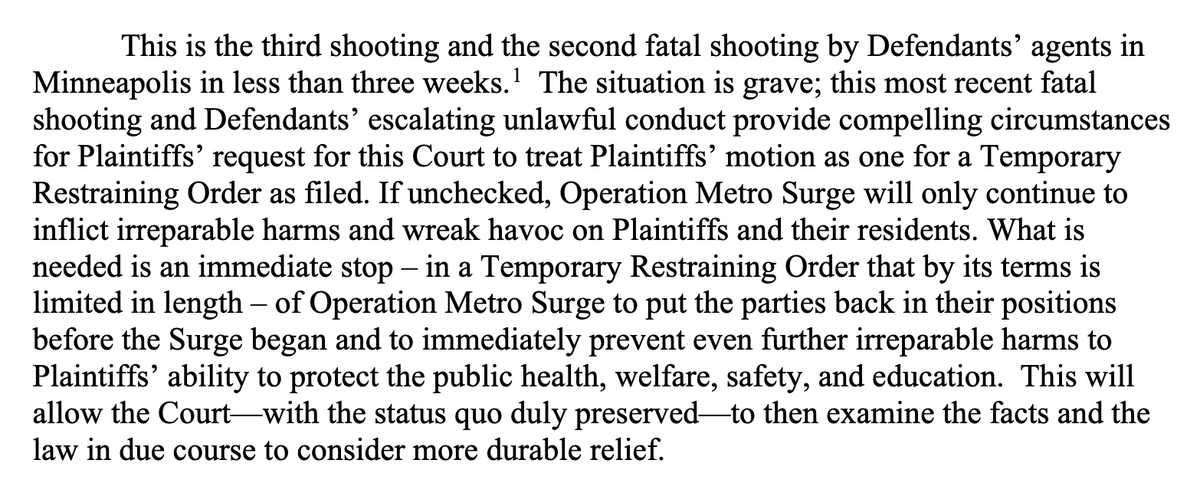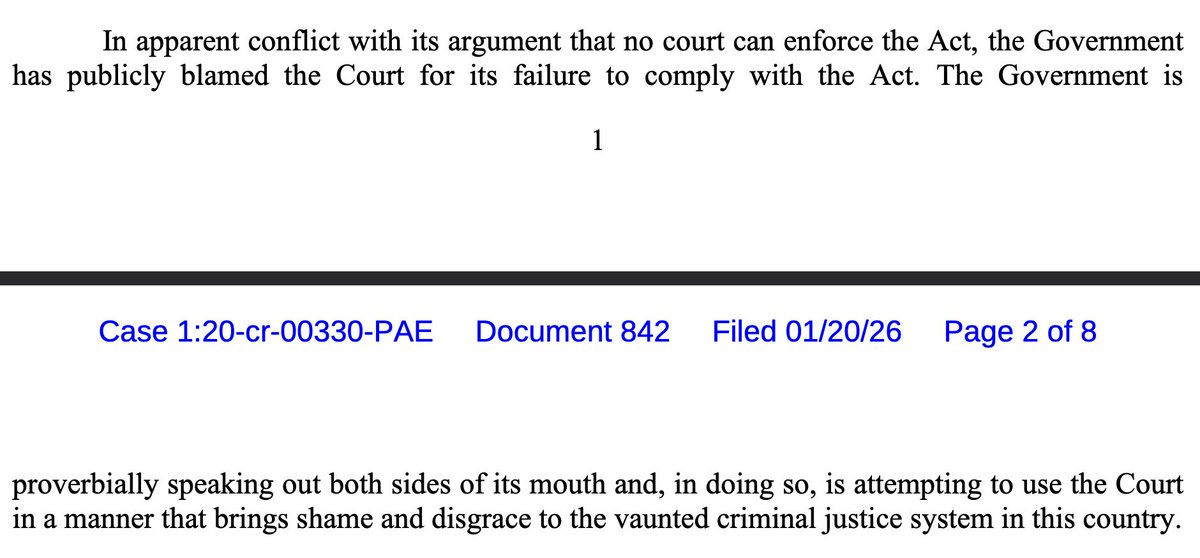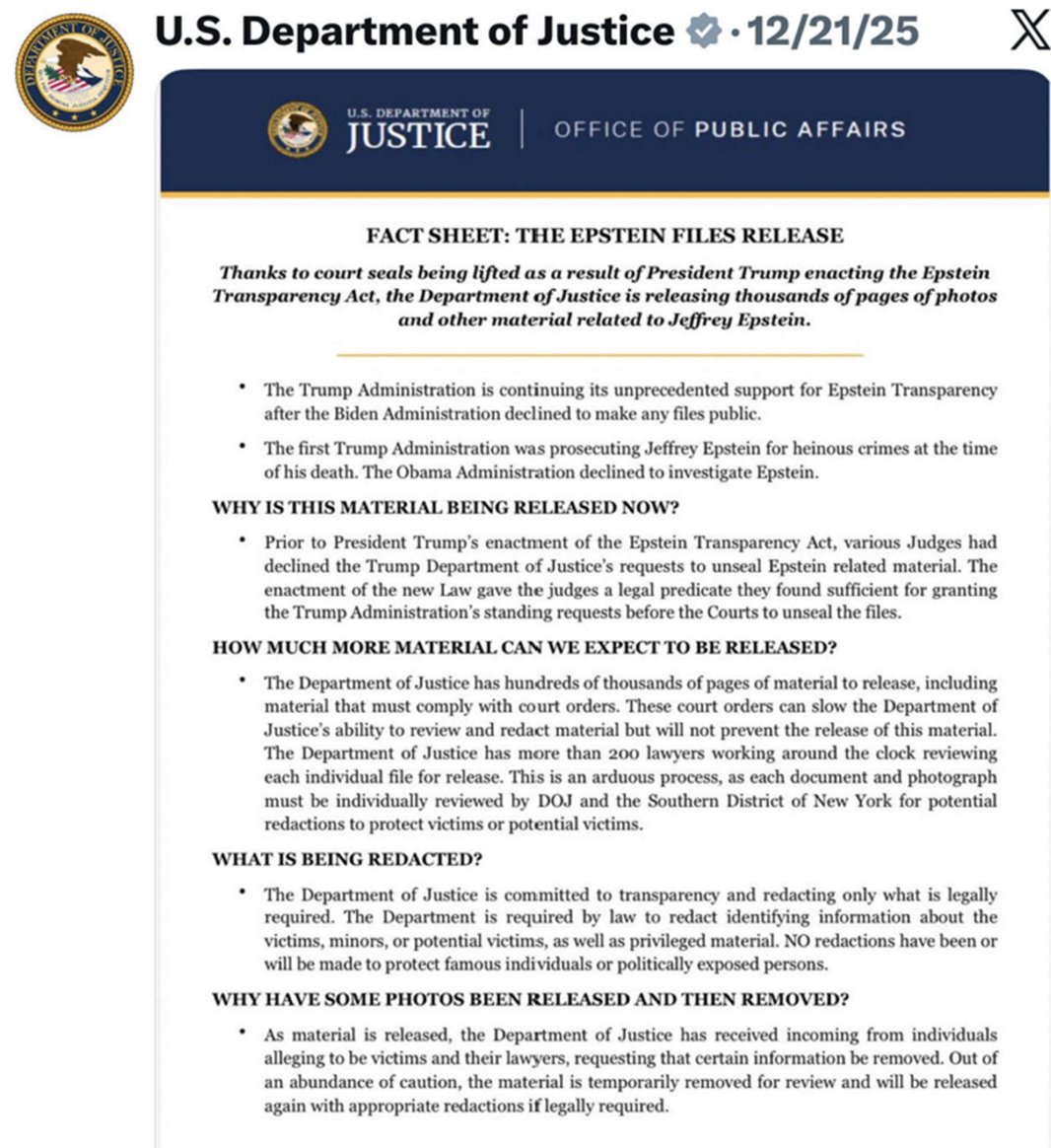Good morning from New York.
Michael Cohen’s cross examination continues. Prosecutors have another chance to have Cohen clarify his testimony—and then, a moment of truth amid the will-he-or-won’t-he speculation.
Will Trump or any other defense witness testify?
Follow along 🧵
Michael Cohen’s cross examination continues. Prosecutors have another chance to have Cohen clarify his testimony—and then, a moment of truth amid the will-he-or-won’t-he speculation.
Will Trump or any other defense witness testify?
Follow along 🧵
By the way, it's a joy to see how many places around the world you all are joining from to follow the live feed.
It's a perk of starting these threads with: "Good morning from New York."
Stand by for the day's proceedings.
It's a perk of starting these threads with: "Good morning from New York."
Stand by for the day's proceedings.
The prosecution enters the courtroom.
Trump enters the courtroom, with an ever-expanding entourage of politicos and the same family member:
Eric Trump.
Eric Trump.
Trump sinks into his usual, forward-crouching position at the defense table for his daily smattering of courtroom photography.
"All rise."
Justice Merchan enters the courtroom, with his usual, "Good morning, Mr. Trump." The parties are meeting early this morning to discuss a pre-trial evidentiary matter.
Justice Merchan enters the courtroom, with his usual, "Good morning, Mr. Trump." The parties are meeting early this morning to discuss a pre-trial evidentiary matter.
Merchan:
"It's become apparent that we're not going to be able to sum up tomorrow."
Summations likely to be next Tuesday, following the Memorial Day weekend.
"It's become apparent that we're not going to be able to sum up tomorrow."
Summations likely to be next Tuesday, following the Memorial Day weekend.
Trump's lead attorney Todd Blanche tries, and so far, fails, to persuade the judge to impeach Michael Cohen's testimony through emails objected to by prosecutors as hearsay.
Merchan: "I don't see any probative value here for impeachment purposes, at all."
It's also "double-hearsay," the judge says.
It's also "double-hearsay," the judge says.
Justice Merchan turns his attention to the defense's expert witness Brad Smith.
The judge previously allowed Smith to offer limited testimony about campaign finance law, before the defense challenged the scope of the ruling.
Background justsecurity.org/wp-content/upl…
The judge previously allowed Smith to offer limited testimony about campaign finance law, before the defense challenged the scope of the ruling.
Background justsecurity.org/wp-content/upl…
Merchan previously barred Smith from offering legal opinions, beyond explaining the basics about how the FEC operates.
But the judge seems skeptical that Smith will be able to confine himself to the boundaries of that ruling.
But the judge seems skeptical that Smith will be able to confine himself to the boundaries of that ruling.
Merchan notes that Smith was also barred from similar testimony during the trial of disgraced crypto billionaire Sam Bankman-Fried.
Prosecutors and defense attorneys can offer arguments about the campaign finance definitions at issue during the charge conference where they're hashing out jury instructions.
Trump's attorney Emil Bove expresses disappointment about the ruling:
"We're restricted in what Mr. Smith can say, and frankly, Mr. Smith reading the statutory definitions is not going to help the jury."
"We're restricted in what Mr. Smith can say, and frankly, Mr. Smith reading the statutory definitions is not going to help the jury."
Justice Merchan tells Bove that he cannot see how Smith can opine on these issues without interpreting the law.
Bove says he has no plan to lead Smith through precedent: "He's a former commissioner of the FEC. So he has an authoritative view of what these things mean."
Bove says he has no plan to lead Smith through precedent: "He's a former commissioner of the FEC. So he has an authoritative view of what these things mean."
Merchan to Team Trump:
"You're asking me for further guidance, but that's exactly why we have the pre-charge conference" before summations — so that the attorneys know what law they are arguing to the jury.
"You're asking me for further guidance, but that's exactly why we have the pre-charge conference" before summations — so that the attorneys know what law they are arguing to the jury.
"Witness entering."
Judge: "Good morning, Mr. Cohen. Welcome back."
The judge reminds Cohen that he's still under oath.
Judge: "Good morning, Mr. Cohen. Welcome back."
The judge reminds Cohen that he's still under oath.
"All rise."
The jurors make their usual B-line to the jury box — again mostly without making eye contact with the defendant.
The jurors make their usual B-line to the jury box — again mostly without making eye contact with the defendant.
As Trump's attorney Todd Blanche resumes his cross, he asks Michael Cohen how many reporters he's spoken to over the weekend.
Cohen says he's spoken to reporters — but not about the case.
Cohen says he's spoken to reporters — but not about the case.
Blanche asks a series of questions about his preparations for the case by prosecutors.
Blanche asks about Rep. Dan Goldman (D-N.Y.), who was previously one of Trump's impeachment prosecutors
Cohen concedes that he lied during the congressional testimony for which Goldman prepped him.
Blanche questions Cohen about text messages related to his taxi medallion business, which have not been entered into evidence — and therefore, aren't shown to the jury.
Explainer:
The defense has latitude to show the witness information to refresh his memory, even if it hasn't been formally entered into evidence.
The defense has latitude to show the witness information to refresh his memory, even if it hasn't been formally entered into evidence.
Blanche's line of questioning explores Cohen's history in the taxi medallion business, which ultimately led to some of his criminal charges.
Cohen tried to help with the marital problems of a business associate, a topic Blanche tried to explore before the prosecution objects.
Cohen tried to help with the marital problems of a business associate, a topic Blanche tried to explore before the prosecution objects.
That business associate, John Lydon, was a mortgage broker with a company called Resolution Consultants.
That's the same name as the entity Cohen used for the hush money payments to Karen McDougal.
That's the same name as the entity Cohen used for the hush money payments to Karen McDougal.
Blanche explores what else Michael Cohen was up to on the week of Oct. 26, 2016, the day that he executed the payoff to Stormy Daniels through his shell company.
Blanche takes on Cohen's two phone calls with Trump on that day, before he opened the account at First Republic Bank.
Cohen said that he spoke to Trump those times about the payoff, and Blanche asks whether that's still his testimony.
It is, Cohen says.
Cohen said that he spoke to Trump those times about the payoff, and Blanche asks whether that's still his testimony.
It is, Cohen says.
Blanche asks whether it "rings a bell" that Trump was going to sit down for an ABC interview with George Stephanopoulos.
Cohen says it doesn't, and Blanche presses him repeatedly on that answer, drawing multiple objections.
All sustained.
Cohen says it doesn't, and Blanche presses him repeatedly on that answer, drawing multiple objections.
All sustained.
The last sustained objection, by Justice Merchan, was more emphatic if a little annoyed that his prior rulings apparently had been ignored.
Blanche's questioning turns to the RedFinch expense, and Cohen describes paying his contact there $20,000 in a "small paper bag."
Cohen says that didn't resolve the matter because the full expense was $50,000.
Cohen says that didn't resolve the matter because the full expense was $50,000.
Blanche notes that Cohen billed the Trump Organization for the full RedFinch expense — and was reimbursed for it — even though he never fully paid it.
Q: So you stole from the Trump Organization, right?
A: Yes, sir.
Q: So you stole from the Trump Organization, right?
A: Yes, sir.
Cohen acknowledges that he was never prosecuted for larceny or paid back the Trump Organization.
He also acknowledges he was paid back the "grossed up" version, and so he was reimbursed more than the expense he never paid.
He also acknowledges he was paid back the "grossed up" version, and so he was reimbursed more than the expense he never paid.
Todd Blanche needles Cohen on that point.
Q: To this day, you've never fixed that?
A: No, sir.
Asked again about whether he stole from the Trump Organization, Cohen reiterates: Yes.
Q: To this day, you've never fixed that?
A: No, sir.
Asked again about whether he stole from the Trump Organization, Cohen reiterates: Yes.
Blanche asks Cohen a series of questions about the $35,000 monthly payments, with sign-offs from Eric Trump and Don Jr. in the first months.
Analysis:
Blanche told jurors as the trial began that these monthly payments were legal payments, not reimbursements. This questioning hints at that argument, without making much headway.
Two of Trump's sworn statements call them reimbursements. The jury heard about both.
Blanche told jurors as the trial began that these monthly payments were legal payments, not reimbursements. This questioning hints at that argument, without making much headway.
Two of Trump's sworn statements call them reimbursements. The jury heard about both.
ICYMI, this morning, via the hallway press pool.
"[Trump] did not respond to shouted questions:
Mr. Trump, will you testify?
Have your lawyers advised you not to testify?
Mr. Trump, do you want to testify?
Are you afraid to testify?"
"[Trump] did not respond to shouted questions:
Mr. Trump, will you testify?
Have your lawyers advised you not to testify?
Mr. Trump, do you want to testify?
Are you afraid to testify?"
Blanche asks Cohen about his professional relationship with Marc Kasowitz, who was Trump's attorney during the Mueller investigation.
Blanche tries to slip in twice into a question that Cohen was paid $35,000 pursuant a "retainer agreement." Prosecutors object both times.
Sustained both times.
Cohen's actual testimony, asked and answered repeatedly, is that these were reimbursements.
Sustained both times.
Cohen's actual testimony, asked and answered repeatedly, is that these were reimbursements.
Blanche's line of questioning explores Cohen raking in money from consultancy agreements with companies like Novartis ($1.2 million), AT&T ($200,000), and Columbus Nova ($80,000/month).
Through these and other clients, Cohen made $4 million, according to his testimony.
Through these and other clients, Cohen made $4 million, according to his testimony.
Q: President Trump was paying you $35,000 a month, correct?
A: Correct.
Blanche finally asks the question in a way that avoids an objection, by not characterizing the payment in any manner.
A: Correct.
Blanche finally asks the question in a way that avoids an objection, by not characterizing the payment in any manner.
After the FBI's search, Michael Cohen agrees, he told people that Trump knew nothing about the payment.
That was before Cohen pleaded guilty and acknowledged making payments at Trump's "direction" and for his benefit.
That was before Cohen pleaded guilty and acknowledged making payments at Trump's "direction" and for his benefit.
Asked whether it would surprised Cohen to learn that he and Costello communicated over the phone 75 times, Cohen responds: "It seems excessive but possible."
Reminder:
During direct, Michael Cohen reviewed a series of emails about attorney Robert Costello opening up a "back channel" to speak to Trump through Rudy Giuliani. Costello hoped to keep Cohen from cooperating with Mueller's investigation, emails suggested.
During direct, Michael Cohen reviewed a series of emails about attorney Robert Costello opening up a "back channel" to speak to Trump through Rudy Giuliani. Costello hoped to keep Cohen from cooperating with Mueller's investigation, emails suggested.
Multiple jurors rub their eyes. Others have been resting their heads on their hands, using their fists or fingers as platforms.
They still appear to be paying attention to the evidence, however, even as the questioning starts to drag.
They still appear to be paying attention to the evidence, however, even as the questioning starts to drag.
When Blanche flashes the emails between Cohen and Costello on their monitors, the jurors appear to get more alert.
Asked how much made on consultancy agreements, Cohen reiterates it amounted to about $4 million.
Blanche adds that he made $35,000 a month adding up to $420,000 from the Trump Organization.
Cohen responds that those were "reimbursements."
Blanche adds that he made $35,000 a month adding up to $420,000 from the Trump Organization.
Cohen responds that those were "reimbursements."
Blanche pivots to Cohen's change in financial fortune between his guilty plea and sentencing.
Cohen acknowledges: "I paid the deficiency of the taxes before sentencing."
Since the fall of 2020, Cohen has made $4.3 million on books and pods, roughly $1 million a year, he says.
Cohen acknowledges: "I paid the deficiency of the taxes before sentencing."
Since the fall of 2020, Cohen has made $4.3 million on books and pods, roughly $1 million a year, he says.
Blanche: "So, you're also, am I correct, pitching a TV show based upon your life?"
Cohen says he's not pitching it, but his producer Phil Alberstat is. The proposed title is "Fixer," he acknowledges.
Morning recess.
Cohen says he's not pitching it, but his producer Phil Alberstat is. The proposed title is "Fixer," he acknowledges.
Morning recess.
Trump and his entourage are back, including Alan Dershowitz.
Some of the GOP officials haven't returned, yet.
Some of the GOP officials haven't returned, yet.
"All rise."
The jury is entering.
The jury is entering.
Blanche resumes his cross.
Q: How long have you been working with the gentleman you described to pitch this show?
A: Approximately three months.
Cohen says the pitches happened after it was shot seven to eight months ago.
Q: How long have you been working with the gentleman you described to pitch this show?
A: Approximately three months.
Cohen says the pitches happened after it was shot seven to eight months ago.
Cohen confirms that he's considering running for Congress, agreeing it's partly because of his name recognition.
"My name recognition is because of the journey I've been on. Is it affiliated with Mr. Trump? Yes." But it's not because of Mr. Trump, he insists.
"My name recognition is because of the journey I've been on. Is it affiliated with Mr. Trump? Yes." But it's not because of Mr. Trump, he insists.
Blanche notes that his journey has included near-daily attacks on Trump.
Cohen acknowledges that he's also considering a third book.
Asked if he has a financial interest in the outcome of this case, Cohen calmly replies: "Yes, sir."
"I talk about it on my podcast. I talk about it on TikTok, and they make money."
But Cohen eventually backpedals a bit, saying the outcome doesn't affect whether he speaks.
"I talk about it on my podcast. I talk about it on TikTok, and they make money."
But Cohen eventually backpedals a bit, saying the outcome doesn't affect whether he speaks.
Cohen then turns the question about the financial interest in Trump's conviction on its head:
"It's better if he's not [convicted], for me, because it gives me more to talk about in the future."
"It's better if he's not [convicted], for me, because it gives me more to talk about in the future."
Q: This trial affects your personal life, doesn't it?
A: Yes, sir.
A: Yes, sir.
Citing Cohen's testimony that he lied for Trump out of loyalty, Blanche asks:
Q: It's true that you will lie out of loyalty, correct?
A: Yes, sir.
Q: It's true that you will lie out of loyalty, correct?
A: Yes, sir.
Blanche then turns that proposition into a question of whether Cohen would lie out of loyalty to prosecutors.
He ends cross by asking if there's "no doubt in your mind" he talked to Trump about the Daniels payoff.
"No doubt," Cohen replies.
Blanche: "No further questions."
He ends cross by asking if there's "no doubt in your mind" he talked to Trump about the Daniels payoff.
"No doubt," Cohen replies.
Blanche: "No further questions."
Prosecutor Susan Hoffinger begins redirect, by having Cohen clean up his answer about whether he testified falsely in Congress in 2019.
During cross, Cohen said he did, but the year he lied to Congress was 2017, he says now.
During cross, Cohen said he did, but the year he lied to Congress was 2017, he says now.
Q: Did you ever send Mr. Weisselberg a retainer agreement?
A: No, ma'am.
Asked why not, Cohen responds that there was no legal work he was being compensated for at the time.
A: No, ma'am.
Asked why not, Cohen responds that there was no legal work he was being compensated for at the time.
Reviewing Cohen's work for Trump and his family over 2017 and 2018, the prosecutor asks him whether he ever billed for that. Cohen says no.
Q: Did you ever get paid a dime for the work in 2018?
A: No, ma'am.
Q: Did you ever get paid a dime for the work in 2018?
A: No, ma'am.
Prosecutor Hoffinger asks Cohen what the RedFinch expense was for, and Cohen talks about the poll-rigging.
Cohen says Trump's performance in a CNBC poll about top business leaders disappointed him, and he wanted to "create an algorithm" to ensure that Trump's numbers would "rise and rise."
Cohen says Trump's performance in a CNBC poll about top business leaders disappointed him, and he wanted to "create an algorithm" to ensure that Trump's numbers would "rise and rise."
The Wall Street Journal originally broke the story about the poll-rigging here. wsj.com/articles/poll-…
Now that redirect has begun, Cohen continues his pattern of delivering his answers straight to the jury.
The prosecutor asks Cohen about stealing the difference on the RedFinch expense in his Trump Org reimbursement.
"Why did you take that extra $30[,000]?" Hoffinger asks.
Cohen says he was angry about his bonus being cut and it was "almost like self-help."
"Why did you take that extra $30[,000]?" Hoffinger asks.
Cohen says he was angry about his bonus being cut and it was "almost like self-help."
Asked whether he acknowledges now that it was wrong to do that, Cohen agrees that it was.
Cohen agreed during cross that NDAs are perfectly legal.
On redirect, the prosecutor asks whether "the circumstance surrounding this NDA" were "perfectly legal."
After an objection is sustained as to leading, she tried again — successfully. Cohen answers that this one wasn't.
On redirect, the prosecutor asks whether "the circumstance surrounding this NDA" were "perfectly legal."
After an objection is sustained as to leading, she tried again — successfully. Cohen answers that this one wasn't.
Prosecutor Hoffinger notes that Cohen may feel like he's on trial here.
Q: But are you actually on trial here?
A: No, ma'am.
Q: But are you actually on trial here?
A: No, ma'am.
Prosecutor Hoffinger turns to the most damaging part of Blanche's cross: Michael Cohen's conversation with Keith Schiller.
But before Hoffinger can get to this, lunch break.
That's because prosecutors want to show Cohen photographs of Trump and Schiller together on that day, and the defense is opposing it.
The prosecution says it proves that Trump and Schiller were together from the time of that call.
Blanche:
"We never asked or implied that Mr. Schiller was not with Mr. Trump on that day."
He says the implication was Cohen and Schiller talked about a different topic, i.e. the 14-year-old prankster.
"We never asked or implied that Mr. Schiller was not with Mr. Trump on that day."
He says the implication was Cohen and Schiller talked about a different topic, i.e. the 14-year-old prankster.
Blanche argues the date and time of the C-Span archives showing Schiller and Trump together amounts to "inadmissible hearsay."
"The rules of evidence still have to apply."
"The rules of evidence still have to apply."
Blanche, on the date and time of the image:
"It's an out-of-court statement being offered for the truth of the matter asserted."
"It's an out-of-court statement being offered for the truth of the matter asserted."
Assistant DA Josh Steinglass points to the C-Span testimony about how times are verified before posting.
"We're entitled to be able to establish [...] that the defendant and Mr. Schiller were together at the time of this phone call."
"We're entitled to be able to establish [...] that the defendant and Mr. Schiller were together at the time of this phone call."
Back from lunch break.
Justice Merchan reviews the testimony of C-Span's custodian of records and recites relevant portions from this evidentiary dispute into the record.
Justice Merchan reviews the testimony of C-Span's custodian of records and recites relevant portions from this evidentiary dispute into the record.
News
Justice Merchan does NOT allow prosecutors to bring in the C-Span images in as-offered during Michael Cohen's redirect.
They wanted the images to confirm Trump and Schiller were together when Cohen called on Oct. 24, 2016.
Justice Merchan does NOT allow prosecutors to bring in the C-Span images in as-offered during Michael Cohen's redirect.
They wanted the images to confirm Trump and Schiller were together when Cohen called on Oct. 24, 2016.
Prosecutors want to call Robert Browning back to testify in order to get the C-Span images introduced into evidence.
News
The defense will likely rest today, Trump's lawyer Todd Blanche says.
The defense will likely rest today, Trump's lawyer Todd Blanche says.
Why this topic came up:
After losing their battle to admit the C-Span evidence into the record, prosecutors sought to recall the custodian of records.
The defense opposed because, among other reasons, there's a "likelihood" they may rest today.
After losing their battle to admit the C-Span evidence into the record, prosecutors sought to recall the custodian of records.
The defense opposed because, among other reasons, there's a "likelihood" they may rest today.
Justice Merchan signaled an openness to breaking after Cohen's testimony today—and letting that prosecutors recall that witness, Robert Browning, first thing tomorrow morning.
The prosecution will see if that would be possible.
The prosecution will see if that would be possible.
C-Span is booking travel right now for the witness, prosecutors say.
Trump's attorney Todd Blanche has a standing objection, saying that the defense has witnesses ready to go.
(Note: They must be short witnesses on such a timetable.)
(Note: They must be short witnesses on such a timetable.)
Justice Merchan doesn't appear to be swayed about breaking to make way for prosecutors to recall the C-Span witness:
"There's no prejudice to anyone that I can see."
"There's no prejudice to anyone that I can see."
The judge also gives Trump's team the option to call the defense witnesses out of order today, and have prosecutors call Browning tomorrow, if the defense prefers.
The C-Span exhibit WILL come in after all, after prosecutors and defense attorneys agree to a stipulation that will avoid the issues of recalling the other witness.
Cohen's testimony resumes.
Prosecutor Hoffinger shows him a photograph of Trump and Keith Schiller.
Prosecutor Hoffinger shows him a photograph of Trump and Keith Schiller.
Hoffinger reads a stipulation showing that the image is a still frame of a video at the date and time stated.
Asked whether he had a number of conversations with Trump about resolving the Stormy Daniels matter, Cohen says: "Yes, ma'am."
Q: Do you recall the general substance of the conversations with Mr. Trump?
A: Yes.
A: Yes.
Cohen says he doesn't have any doubt about his conversations with Trump about resolving the Stormy Daniels matter.
"No doubt," he says.
"No doubt," he says.
Technical issues.
Prosecutors want to play a recording of Cohen's conversation with Keith Davidson for the jurors, but there's a false start and an early recess.
This snippet of transcript appeared on the screen.
Prosecutors want to play a recording of Cohen's conversation with Keith Davidson for the jurors, but there's a false start and an early recess.
This snippet of transcript appeared on the screen.
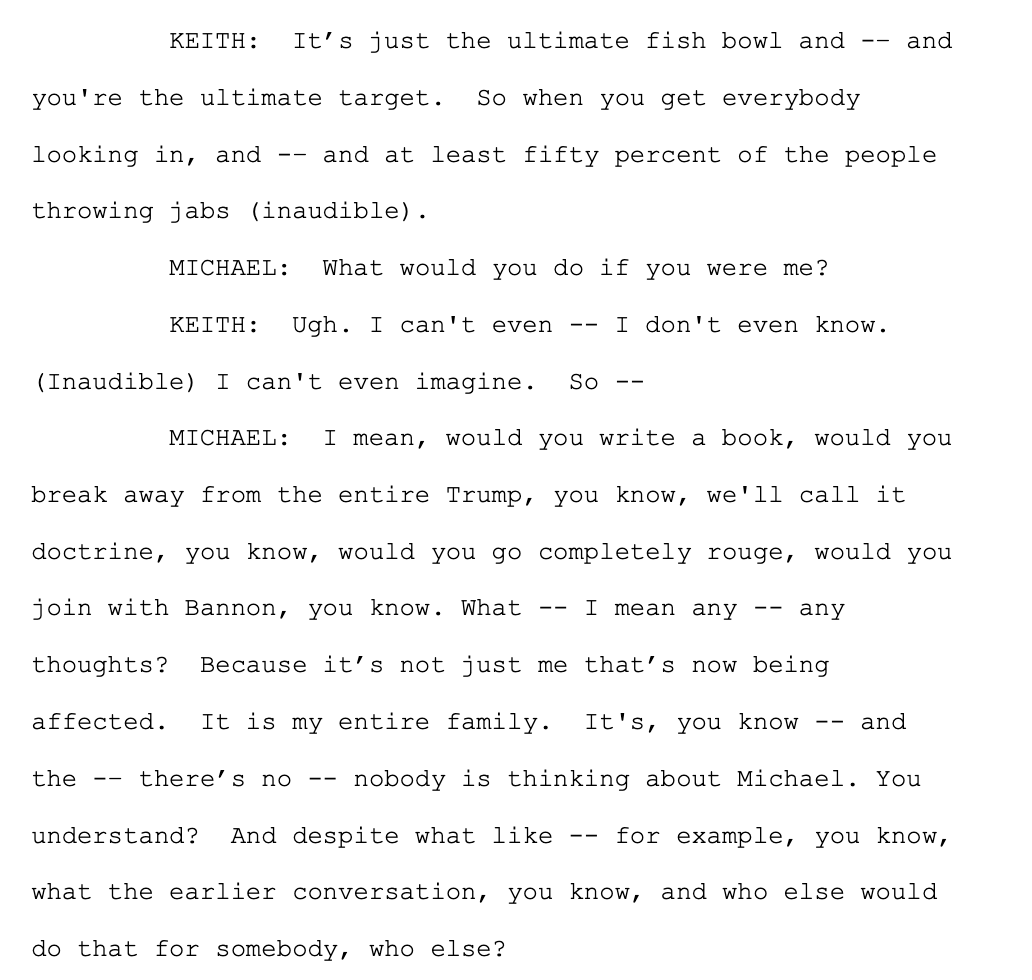
The hallway press pool has another dispatch:
"Trump walked into the courtroom at 2:07 p.m. He waved and gave a fist pump to the cameras with his right hand. He did not respond to shouted questions:
Mr. Trump, are you ready for closings?
Where's Melania?"
"Trump walked into the courtroom at 2:07 p.m. He waved and gave a fist pump to the cameras with his right hand. He did not respond to shouted questions:
Mr. Trump, are you ready for closings?
Where's Melania?"
We're back, and the audio is playing at this section about 10 pages into the transcript.
Listen along here. pdfs.nycourts.gov/PeopleVs.DTrum…

Listen along here. pdfs.nycourts.gov/PeopleVs.DTrum…
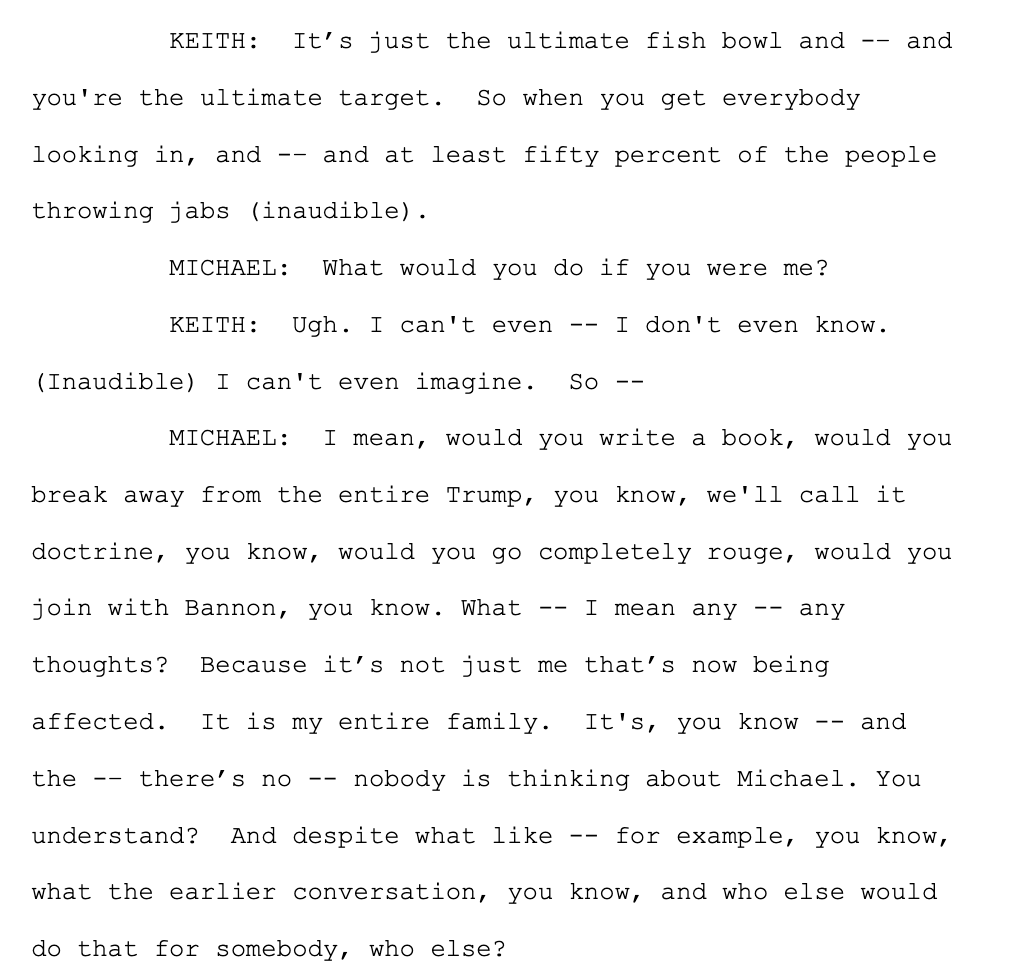
Cohen is asked about his comment to Keith Davidson on Oct. 16, 2017.
"I can’t even tell you how many times he said to me, you know, 'I hate the fact that we did it.'"
Asked to clarify the modifiers, Cohen says "he" means Trump and "it" means paying off Stormy Daniels.
"I can’t even tell you how many times he said to me, you know, 'I hate the fact that we did it.'"
Asked to clarify the modifiers, Cohen says "he" means Trump and "it" means paying off Stormy Daniels.

Asked whether attacks on him have been painful to him and his family, Cohen responds: "Very much so."
Prosecutor Hoffinger says she has nothing further.
Prosecutor Hoffinger says she has nothing further.
Asked whether Trump had anything to do with the tax crimes and bank fraud charges, Cohen answers no.
Q: Is one of the reasons you lost your license to practice law because of those tax crimes and making false statements to a bank?
Objection, asked and answered.
Sustained.
Q: Is one of the reasons you lost your license to practice law because of those tax crimes and making false statements to a bank?
Objection, asked and answered.
Sustained.
Cohen acknowledges that he signed a waiver to speak about his conversations with Robert Costello.
"Although I do not believe that any of my communications with Costello or other lawyers at DHC are subject to attorney-client privilege, I hereby waive" any privilege, it read.
"Although I do not believe that any of my communications with Costello or other lawyers at DHC are subject to attorney-client privilege, I hereby waive" any privilege, it read.
Blanche tries to suggest that Cohen previously thought the communications were privileged before signing that waiver, but Cohen pushes back:
"I accepted that [Costello] wanted them to be attorney-client privileged."
"I accepted that [Costello] wanted them to be attorney-client privileged."
Blanche notes that Cohen's chat with Schiller on Oct. 24, 2016, was about 90 seconds long.
With heavy sarcasm, Blanche asks whether Cohen's testimony is that he spoke to Schiller about the 14-year-old prankster, passed the phone to Trump, and chatted Daniels in that time.
With heavy sarcasm, Blanche asks whether Cohen's testimony is that he spoke to Schiller about the 14-year-old prankster, passed the phone to Trump, and chatted Daniels in that time.

Without flinching, Cohen replied in the affirmative.
After a few more questions, Blanche ends his re-cross.
Cohen is excused and leaves the courtroom.
After a few more questions, Blanche ends his re-cross.
Cohen is excused and leaves the courtroom.
Prosecutors: The People rest.
The defense calls: Daniel Sitko, who is Blanche's paralegal.
Sitko is offering the defense's version of what the DA's paralegal created: a summary of phone calls.
The jury is shown call logs of Michael Cohen's phone calls to Robert Costello's office at Davidoff Hutcher & Cintron.
On cross, the witness concedes that the calls specifically to or from the firm would not be traceable to a specific person, like Costello.
Some of the calls involving the firm were forwarded to a number ending in "3595," which the witness says indicates they were forwarded to voicemail.
These were double-counted in the records, Sitko agrees.
These were double-counted in the records, Sitko agrees.
"The defense calls Robert Costello."—
Prosecutor Susan Hoffinger: "Your honor, we need to approach."
(Sidebar)
Prosecutor Susan Hoffinger: "Your honor, we need to approach."
(Sidebar)
The sidebar extends so long that the judge must excuse the jury for arguments.
When they leave, Justice Merchan asks prosecutor Susan Hoffinger to lodge her objections. She wants Costello's testimony to be excluded.
When they leave, Justice Merchan asks prosecutor Susan Hoffinger to lodge her objections. She wants Costello's testimony to be excluded.
If Costello's testimony is admitted, Hoffinger says, his testimony must be strictly limited:
"They're not entitled to elicit from Mr. Costello their opinions on Mr. Cohen's credibility."
Trump lawyer Emil Bove says he's being offered to rebut the alleged "pressure campaign."
"They're not entitled to elicit from Mr. Costello their opinions on Mr. Cohen's credibility."
Trump lawyer Emil Bove says he's being offered to rebut the alleged "pressure campaign."
Bove says it's the prosecution's doing that Costello has been featured in the case:
"They brought it up."
"They brought it up."
Hoffinger says they did not put Costello on their witness list.
Justice Merchan says he's going to pause for five minutes, telling the lawyers not to leave the courtroom.
Justice Merchan rules that Robert Costello can be called to scrutinize Cohen's two allegedly inconsistent statements, and he'll have "some latitude" to testify on the alleged pressure campaign.
But the judge says he won't allow a "trial within a trial" beyond that.
But the judge says he won't allow a "trial within a trial" beyond that.
Bove: "The defense calls Robert Costello."
Costello takes the witness stand and takes the oath.
Costello takes the witness stand and takes the oath.
Bove's questioning begins with biographical details of Costello's life.
Costello was previously a federal prosecutor in Manhattan, before his work at his current law firm.
Costello was previously a federal prosecutor in Manhattan, before his work at his current law firm.
Bove asks Costello about his meeting at the Regency Hotel.
Cohen was "absolutely manic" for the first two hours of that meeting, saying: "My life is shattered. My family's life was shattered."
Cohen was "absolutely manic" for the first two hours of that meeting, saying: "My life is shattered. My family's life was shattered."
Cohen asked for an "escape route," Costello said.
Bove asks a series of questions interrupted by a series of sustained objections by prosecutors.
Costello quotes Cohen as saying:
"I swear to God, Bob. I don't have anything on Donald Trump."
Costello also quotes Cohen saying:
"I don't understand why they're trying to put me in jail for some f-ing NDAs."
"I swear to God, Bob. I don't have anything on Donald Trump."
Costello also quotes Cohen saying:
"I don't understand why they're trying to put me in jail for some f-ing NDAs."
As Costello continues his answer, prosecutor Hoffinger objects again. Sustained again.
After another sustained objection, Merchan says: "Please approach," with a hint of give-'em-an-inch exasperation in his voice at the scope of the questioning.
After another sustained objection, Merchan says: "Please approach," with a hint of give-'em-an-inch exasperation in his voice at the scope of the questioning.
Bove gets a pinpointed question about Trump's knowledge over the plate, and Costello replies:
"Michael Cohen said numerous times that President Trump knew nothing about these payments."
Costello repeats that Cohen said this "numerous" times.
"Michael Cohen said numerous times that President Trump knew nothing about these payments."
Costello repeats that Cohen said this "numerous" times.
Prosecutor: Objection.
Judge: Sustained.
Costello: "Geez!"
Merchan to Costello, with annoyance: "I'm sorry?"
Judge: Sustained.
Costello: "Geez!"
Merchan to Costello, with annoyance: "I'm sorry?"
Merchan excuses the jury to castigate Robert Costello.
"I want to discuss proper decorum in my courtroom. [...]
"If you don't like my ruling, you don't say 'Geez!'"
He also may not give him "side eye."
"I want to discuss proper decorum in my courtroom. [...]
"If you don't like my ruling, you don't say 'Geez!'"
He also may not give him "side eye."
Merchan orders the courtroom cleared.
Trump’s entourage in the first couple of rows appears to be allowed to stay.
The press is in the hallway.
The press is in the hallway.
We're back, and so is the jury.
What happened after the courtroom was cleared? I'll be eager to see tonight's transcript.
What happened after the courtroom was cleared? I'll be eager to see tonight's transcript.
Bove asks Costello about another email.
Bove's questioning refers to a series of messages between Costello and Cohen, set against phone logs of their calls.
Costello:
"Mr. Cohen was making constant complaints about Rudy Giuliani" and his comments to the press.
The witness continues his answer until the prosecutor objects.
Judge: Sustained.
Costello continues.
Judge: Sustained, followed by an instruction to Costello.
"Mr. Cohen was making constant complaints about Rudy Giuliani" and his comments to the press.
The witness continues his answer until the prosecutor objects.
Judge: Sustained.
Costello continues.
Judge: Sustained, followed by an instruction to Costello.
Q: Mr. Costello, did you ever put any pressure on Michael Cohen to do anything?
A: No.
Q: Did you ever instruct him to interact with Rudy Giuliani on anything?
A: Not at all.
A: No.
Q: Did you ever instruct him to interact with Rudy Giuliani on anything?
A: Not at all.
Costello said he had "exclusively" Michael Cohen's interests in mind during his time speaking with him.
Costello concedes he's spoken "frequently" in media and before the House Judiciary Committee last Wednesday.
Bove: "Nothing further, your honor."
Bove: "Nothing further, your honor."
Prosecutor Susan Hoffinger: "Good afternoon, Mr. Costello."
Costello: "Hi."
Costello: "Hi."
Hoffinger shows Costello an email from his partner, Jeff Citron, extolling his experience to Cohen.
Q: You and your partner thought this would be a good opportunity to get Michael Cohen as your client?
Costello pushes back, saying this was his partner's doing.
Q: You and your partner thought this would be a good opportunity to get Michael Cohen as your client?
Costello pushes back, saying this was his partner's doing.
Costello acknowledges Cohen's case would have been high-profile and generated publicity.
Asked whether retaining Cohen would have been a big win for his law firm, Costello replies: "I would say no. I didn't want to have him as a client for the firm."
Costello's son responded to the news this way on April 20, 2018:
"Wow. That's big news. Congrats Dad. I hope this leads to a lot of good things coming your way."
"Wow. That's big news. Congrats Dad. I hope this leads to a lot of good things coming your way."
Full tennis-match eyes from the jurors as the prosecutor volleys questions and answers with the witness.
Q: You know what a search warrant is, do you not?
A: Of course I do!
A: Of course I do!
Asked whether it's also "pretty serious" for the FBI to search a lawyer's office, Costello says it's "very serious."
Costello says of Cohen: "He was suicidal that day, and acting very manic."
Costello says of Cohen: "He was suicidal that day, and acting very manic."
Q: "You thought he was being a drama queen, didn't you?"
At first, Costello answers no, but he says that Cohen said he was "on the roof of the Regency Hotel and he was going to jump off."
At first, Costello answers no, but he says that Cohen said he was "on the roof of the Regency Hotel and he was going to jump off."
Judge: "Counsel, please approach."
It's past the usual 4:30 p.m. ET stop time, and once sidebar ends, trial closes for the day.
Day Two of Costello's cross coming up tomorrow.
It's past the usual 4:30 p.m. ET stop time, and once sidebar ends, trial closes for the day.
Day Two of Costello's cross coming up tomorrow.
During the post-trial session, Trump's lead attorney Todd Blanche moves for an order of dismissal.
This is routine after the prosecution completes its case.
This is routine after the prosecution completes its case.
Blanche:
"There is no evidence that there's any intent to defraud by President Trump."
"There is no evidence that there's any intent to defraud by President Trump."
Blanche:
"These are records on his personal— his personal records at the Trump Organization."
"These are records on his personal— his personal records at the Trump Organization."
Blanche says there was "zero" evidence that anyone was thinking of a campaign finance charge when Stormy Daniels was paid, or when the meeting with Weisselberg happened.
Blanche says there's "absolutely no evidence" that Cohen, David Pecker, Dylan Howard or anyone else had criminal intent during the conduct at issue in the case.
(Note: Pecker testified AMI entered the non-prosecution agreement because he thought they admitted to a campaign violation.)
(Note: Pecker testified AMI entered the non-prosecution agreement because he thought they admitted to a campaign violation.)
A text message also showed Dylan Howard darkly musing that Trump may give him a pardon for "electoral fraud."
(But the text couldn't come in because neither Howard nor the recipient testified.)
(But the text couldn't come in because neither Howard nor the recipient testified.)
https://x.com/KlasfeldReports/status/1785301174477902077
Blanche also asks for a directed verdict because Michael Cohen's testimony isn't credible.
Justice Merchan skeptically repeats that Blanche wants him to find Cohen's testimony not credible "as a matter of law."
Justice Merchan skeptically repeats that Blanche wants him to find Cohen's testimony not credible "as a matter of law."
Justice Merchan pointedly asks whether his position is that Cohen's testimony was an "irrefutable lie" that can nevertheless fool "12 New Yorkers."
Then, he hears from the prosecution.
ADA Matthew Colangelo is up
Then, he hears from the prosecution.
ADA Matthew Colangelo is up
Colangelo notes that the falsifying business records statute punishes anyone "causing" the falsified records:
"As a matter of law, it is sufficient, more than sufficient, that the defendant set in motion the sequence of events" leading to the falsification of records.
"As a matter of law, it is sufficient, more than sufficient, that the defendant set in motion the sequence of events" leading to the falsification of records.
Adding it isn't necessary to deliver full summations on the dismissal bid, Colangelo says the trial record "overwhelmingly supports" each offense.
Justice Merchan says he'll reserve decision.
Then, Todd Blanche wants another word in. The judge allows it.
Justice Merchan says he'll reserve decision.
Then, Todd Blanche wants another word in. The judge allows it.
Now, trial is actually adjourned until Costello's cross continues on Tuesday morning.
I'll cover it live from the courtroom then, as I have and will ever day, with analysis after the proceedings on The Last Word on MSNBC at 10 p.m. ET.
I'll cover it live from the courtroom then, as I have and will ever day, with analysis after the proceedings on The Last Word on MSNBC at 10 p.m. ET.
• • •
Missing some Tweet in this thread? You can try to
force a refresh


